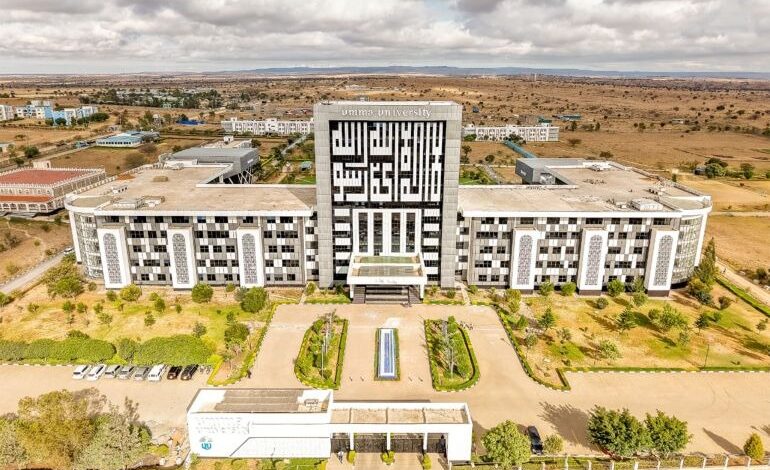
-
Umma University, Kenya’s first fully accredited Islamic university, has emerged as one of the country’s most significant centers of learning. It traces its origins to 1997 when it was founded in Thika as Thika College of Sharia and Islamic Studies by the late Kuwaiti philanthropist Dr. Abdul Rahman Al-Sumait, with support from the Kuwaiti Direct Aid Society.
-
Umma University’s reach extends well beyond national borders and currently, about 3,000 students are enrolled. The university provides scholarships not only to underprivileged Kenyan students but also to refugees.
In the heart of Kenya, where the richness of nature blends with cultural diversity, Umma University has emerged as one of the country’s most significant centers of learning. Over the past two decades, it has built a reputation for academic excellence while staying rooted in its spiritual foundations, reported Al Jazeera.
On Tuesday, President William Ruto officially inaugurated the institution, making it Kenya’s first fully accredited Islamic university. Speaking at the opening, he emphasized his government’s commitment to strengthening higher education so that universities can produce graduates who are ethical, skilled, and innovative. He noted that Kenya’s development depends on education that creates jobs, advances technology, and addresses pressing challenges.
To achieve this, President Ruto highlighted reforms that include strengthening governance, restructuring funding models, and making education more affordable. He said the government’s new student-centered funding framework will reduce fees and widen access to higher education. During the event, he also laid the foundation stone for the third phase of the College of Engineering, describing it as a major step in preparing Kenyan youth to lead future industries.
Roots and growth
Umma University traces its origins to 1997 when it was founded in Thika as Thika College of Sharia and Islamic Studies by the late Kuwaiti philanthropist Dr. Abdul Rahman Al-Sumait, with support from the Kuwaiti Direct Aid Society. Initially a small college, it expanded steadily, gaining accreditation in 2007 and partnering with the International University of Africa in Sudan to begin offering bachelor’s degrees.
In 2013, it was granted university status and renamed Umma University. With official accreditation from Kenya’s Ministry of Education, it broadened its programs beyond Islamic studies. Over time, it evolved into a multi-faculty institution attracting students from across Kenya and neighboring countries. Its recognition as a fully chartered university came in 2019 under former President Uhuru Kenyatta.
Dr. Halima Sa’adu Abdullahi, the Vice Chancellor, explains that Umma University holds a unique place in Kenya’s education system. While many Christian colleges exist, it is the first Islamic university to receive formal recognition. She notes that regardless of specialization, all students study Arabic, Islamic history, and an introduction to Islam, ensuring that its identity remains rooted in its founding principles.
Academic expansion
Despite its Islamic foundation, Umma University has not confined itself to religious studies. It now operates five colleges: Islamic Studies and Sharia, Nursing and Midwifery, Business and Technology, Education and Social Sciences, and Law. Graduate programs, including a doctoral program in Islamic Studies, have also been launched.
Coinciding with its inauguration, the university announced the opening of new colleges and departments, including an Institute of Vocational and Technical Training. Plans are underway for medical and engineering faculties, which have already been accredited.
Infrastructure has also grown. The second phase of development included a nine-story complex housing classrooms, laboratories, libraries, medical units, and administrative offices. Student housing was expanded, and renewable energy and security systems were installed.
The university stresses that education is not confined to theoretical learning but should cultivate socially responsible graduates. Faculty and students have engaged in research on food security, agricultural innovation, peacebuilding, and community development, making the university a partner in Kenya’s broader progress.
A diverse environment
Umma University prides itself on its cultural mix. Students from Nairobi, Mombasa, Lamu, and Garissa study alongside peers from Somalia, Rwanda, Burundi, Uganda, and beyond. This diversity, says the administration, reflects Kenya’s multiethnic and multireligious reality and enriches the learning experience.
The institution finances itself mainly through tuition fees, though support from donors, particularly the Direct Aid Society, has been instrumental in infrastructure development and student scholarships. According to Dr. Abdullahi, a priority has been providing opportunities for Muslim children in Kenya and ensuring they graduate with the skills required for the labor market.
Currently, about 3,000 students are enrolled. The university provides scholarships not only to underprivileged Kenyan students but also to refugees. Partnerships with companies and institutions give students practical training opportunities, improving their employment prospects after graduation. Importantly, enrollment is not limited to Muslims; around 10 percent of the student body is non-Muslim.
Beyond Kenya
Umma University’s reach extends well beyond national borders. Its student body includes learners from Sierra Leone, Zambia, Zimbabwe, and even from countries outside Africa, such as Qatar, Canada, and the United States. In addition to university programs, it runs a primary and secondary school, student housing, and an orphanage.
Challenges remain, especially regarding research funding and the high cost of infrastructure expansion. With strong competition among Kenya’s public and private universities, sustaining growth requires continuous innovation. Yet the leadership views these challenges as opportunities to push forward.
The university also maintains academic cooperation with international institutions such as the International University of Africa in Sudan and the Islamic University of Medina. These collaborations provide faculty, scholarships, and academic resources.
Looking ahead
From its beginnings as a small Islamic college to its status today as a fully-fledged university, Umma has come a long way. Its ambition is to rank among East Africa’s leading institutions, producing graduates equipped with both modern skills and strong social awareness.
As Vice Chancellor Dr. Abdullahi notes, the university is building not only professionals but also responsible citizens. In a rapidly changing Kenya, Umma University stands as a bridge between academic ambition and cultural values, preparing a generation capable of contributing both locally and globally.
Follow The Times Kuwait on
X, Instagram and Facebook for the latest news updates












